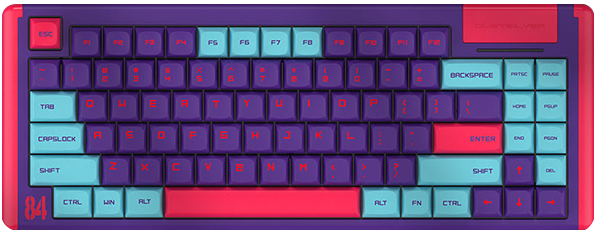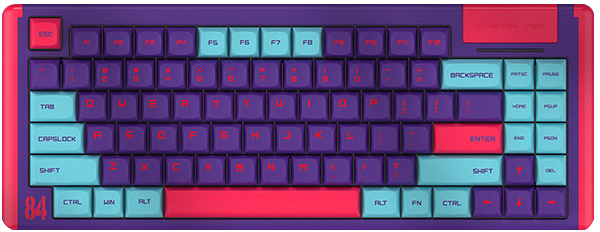When it comes to programming, having the right tools is essential. One tool that is often overlooked is the mechanical keyboard. This type of keyboard offers several advantages over traditional keyboards, making it an invaluable asset for any programmer. In this blog post, we will discuss why a mechanical keyboard is a must-have for programming and how it can help you become a better programmer.
The Different Types Of Keyboards
When it comes to keyboards, there are two main types of keyboards available for use: mechanical keyboards and membrane keyboards. A mechanical keyboard is a type of keyboard that uses individual switches beneath each key to register a keystroke. Mechanical keyboards come in various types such as linear, tactile, and clicky switches. Membrane keyboards, on the other hand, utilize rubber or silicone domes beneath each key to register a keystroke, which results in a softer typing experience.
Mechanical keyboards are well-known for their dependability and accuracy. They offer a more tactile feedback when typing compared to membrane keyboards, and they provide excellent responsiveness that is great for gaming as well as programming. With mechanical keyboards, users can type faster with less fatigue due to the spring-loaded design. Mechanical keyboards also offer great customization options such as RGB lighting, macros, and special keycaps. This allows users to further customize their keyboard according to their preferences. Moreover, mechanical keyboards tend to last longer than membrane keyboards due to their durable construction and high quality parts. They are also more resistant to dust and water spills than membrane keyboards, making them ideal for heavy duty applications. The mechanical keys can be removed easily without affecting the overall performance of the keyboard, allowing users to change out worn keys quickly. Mechanical keyboards also feature anti-ghosting capabilities which allow multiple key presses at once without causing any errors. Lastly, mechanical keyboards typically require less force to actuate keys than membrane keyboards, resulting in less strain on your hands during long periods of typing.
The Benefits Of Using A Mechanical Keyboard
A mechanical keyboard is a great tool for programming. Mechanical keyboards are known for their tactile feedback, which makes typing and coding easier and more efficient. The keys have a springy action that feels more responsive than traditional keyboards, making it easier to type with fewer errors.
Additionally, the switches found in mechanical keyboards make them much more durable than other types of keyboards. The switches can last up to ten times longer than typical keyboards, meaning they’re less likely to need replacing or repair. In the long term, this may save you both time and money.
In addition to being more durable, mechanical keyboards are also often more aesthetically pleasing than traditional keyboards. Many mechanical keyboards come in different colors and designs, allowing you to customize your setup according to your preferences.
Finally, mechanical keyboards are often preferred by gamers and coders alike because they offer better precision and accuracy than other types of keyboards. With their precise keystrokes and responsiveness, they make gaming and coding much easier. They also provide a satisfying sound when typing, which many people find pleasurable.
Overall, mechanical keyboards offer a number of benefits for programming purposes, making them an excellent choice for anyone who wants to maximize their efficiency and accuracy.
Google Pixelbook 12in: A Detailed Specs & Performance Reviews
The Best Mechanical Keyboards For Programming

When it comes to selecting a mechanical keyboard for programming, there are several options available to you. It’s important to consider the features and design of each keyboard when making your decision. Some of the best mechanical keyboards for programming include:
- DAS Keyboard 4 Professional: This mechanical keyboard has a built-in USB hub and Cherry MX Blue switches, which make it perfect for programming and typing. The media controls and volume knob make it easy to adjust your music and settings while working.
- Corsair K95 RGB Platinum: This keyboard is designed for gaming and programming, with Cherry MX Brown switches and onboard memory to store profiles. The keyboard also has six dedicated macro keys and adjustable feet for better ergonomics.
- Logitech G Pro Mechanical Keyboard: This mechanical keyboard is designed with gamers in mind, with its fast response time and comfortable design. It also has customizable RGB lighting and programmable F keys, perfect for programming tasks.
- Razer Blackwidow Elite: This mechanical keyboard features Razer’s Green switches, as well as a multi-functional digital dial and customizable media keys. The backlighting can be customized to match your setup and it has an ergonomic design that makes it great for programming.
When choosing the right mechanical keyboard for programming, it’s important to consider your needs and the features that are important to you. Keep in mind that some keyboards have special features that may make them better suited for certain tasks than others.
The Bottom Line
When it comes to programming, a mechanical keyboard is the ideal choice. It offers increased accuracy, improved typing speed and comfort, better tactile feedback and durability, and more control over key assignments. By investing in a quality mechanical keyboard, you’ll be able to work faster and more efficiently while feeling comfortable and in control. Whether you’re a professional programmer or just getting started, a mechanical keyboard can make all the difference. With its superior response time and ergonomic design, mechanical keyboards are perfect for writing code quickly and accurately. Mechanical keyboards also provide superior tactile feedback compared to traditional membrane keyboards – this allows you to easily distinguish between pressing one key or another without looking down at your hands.
Furthermore, mechanical keyboards are much more durable than their membrane counterparts – they are designed to withstand tens of millions of keystrokes, so even after prolonged use they should continue working like new. With mechanical keyboards, you have far greater control over your key assignments – meaning that you can set specific keys to perform certain tasks at the press of a button. Finally, mechanical keyboards offer excellent sound dampening capabilities so that your workspace remains quiet and distraction-free even during long coding sessions. All these features combine to make mechanical keyboards an essential tool for programming.














